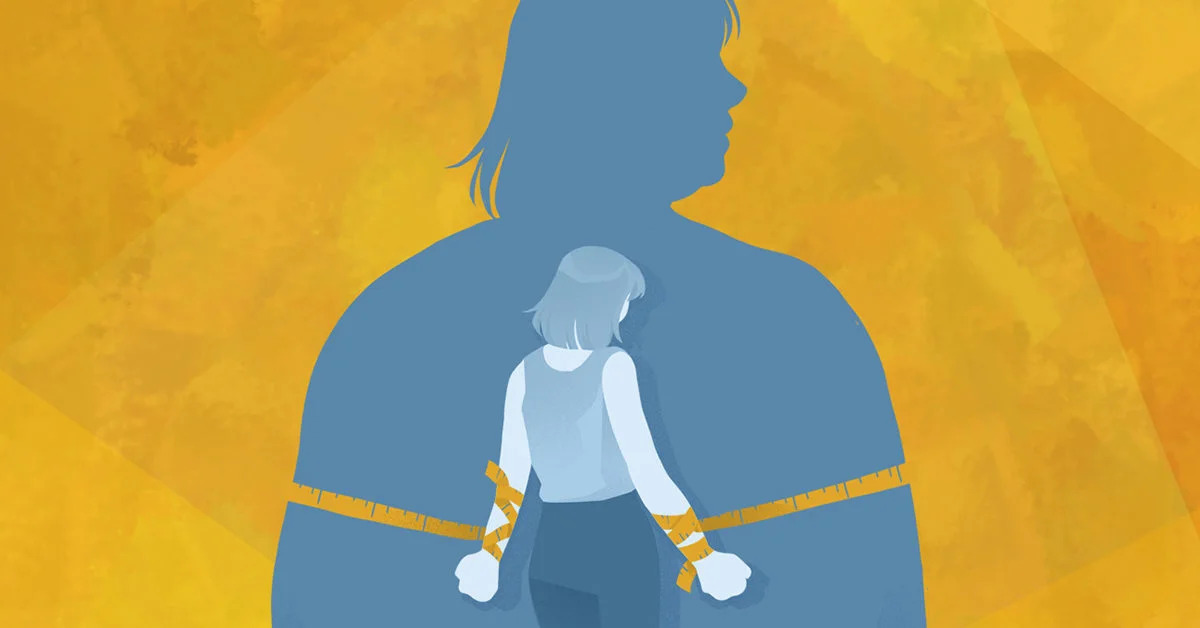Aditi had always been conscious of her weight, constantly comparing herself to the images of ‘Perfect’ models that seemed to flood our Instagram feeds. Aditi believed that her worth was directly tied to her appearance, and this burden weighed heavily on her mind.
According to recent studies, approximately 91% of women are unhappy with their bodies, with 45% of them reporting a negative impact on their self-esteem and mental well-being.
Aditi, like many others, experienced the damaging effects of societal pressures to conform to unrealistic beauty standards. She spent hours scrolling through social media, bombarded with images of seemingly flawless women, leading her to question her own worth. The relentless pursuit of the "perfect" body seemed unattainable, leaving her feeling defeated and trapped in a cycle of self-hate.
Over time, Aditi's obsession with her weight began to take a toll on her mental health. She experienced feelings of anxiety and depression, constantly feeling inadequate and judged. The weight on her mind soon manifested in physical symptoms such as sleep disturbances and loss of appetite. Aditi felt trapped, unable to escape the constant battle within her own mind.
Fortunately, Aditi's story doesn't end there. One day, while browsing the internet for answers, she stumbled upon a support group specifically designed for women struggling with body image issues. Intrigued, she decided to attend a meeting, hoping to find solace among others who shared her experiences.
In the support group, Aditi met women from all walks of life, each with their own unique stories of battling society's expectations. They shared their struggles openly, discussing the damaging impact of weight stigma and the need for a shift in societal perception. As Aditi began to understand the connection between weight, mental health, and societal pressures, she realized that change needed to happen on a broader scale. She became an advocate, spreading awareness about the detrimental effects of unrealistic beauty standards and the importance of prioritizing mental well-being over appearance.
Overcoming body issues is a journey that requires patience, self-compassion, and a holistic approach to self-care. Here are some steps that can help individuals navigate and overcome body issues:
1. Recognize and challenge negative thoughts: Start by acknowledging and challenging negative thoughts about your body. Become aware of when you engage in negative self-talk and replace those thoughts with positive and realistic affirmations. Remind yourself that your worth is not solely determined by your appearance.
2. Focus on self-care and overall well-being: Shift your focus from solely physical appearance to overall well-being. Engage in activities that make you feel good, such as exercising for health and enjoyment rather than weight loss. Practice self-care activities like meditation, yoga, or hobbies that promote relaxation and self-expression.
3. Seek professional help if needed: If body issues are severely impacting your mental health and daily life, consider seeking professional help. A therapist or counsellor can provide guidance and support in navigating body image concerns. They can help you develop coping strategies and address underlying issues that may contribute to negative body image.
4. Practice gratitude and self-acceptance: Cultivate gratitude for your body and its capabilities. Focus on what your body can do rather than its perceived flaws. Treat your body with kindness by nourishing it with balanced meals, staying hydrated, and getting enough rest. Embrace self-acceptance by celebrating your uniqueness and practising self-love.
Through her advocacy work, Aditi discovered that many women who struggled with weight and body image issues also faced mental health challenges, such as depression, anxiety, and eating disorders. The constant pressure to meet societal expectations took a toll on their emotional well-being, perpetuating a dangerous cycle of self-doubt and negative body image.

 91 per cent of Women like Aditi face a silent struggle with weight and body image that often play with their mental health. let’s highlight the urgent need for change in societal perceptions and standards. By sharing stories, raising awareness, and promoting self-acceptance, we can pave the way for a more inclusive and compassionate society, where women no longer suffer in silence under the weight of appearance-based expectations
91 per cent of Women like Aditi face a silent struggle with weight and body image that often play with their mental health. let’s highlight the urgent need for change in societal perceptions and standards. By sharing stories, raising awareness, and promoting self-acceptance, we can pave the way for a more inclusive and compassionate society, where women no longer suffer in silence under the weight of appearance-based expectations









.jpeg)



















.jpeg)
